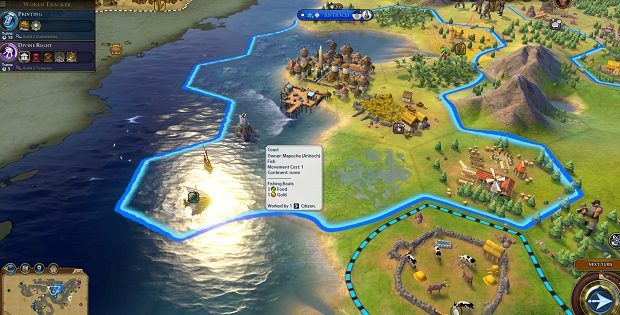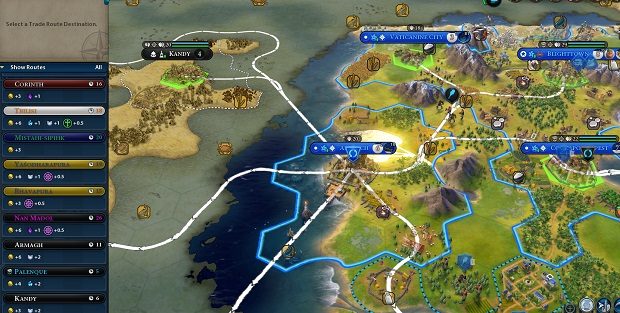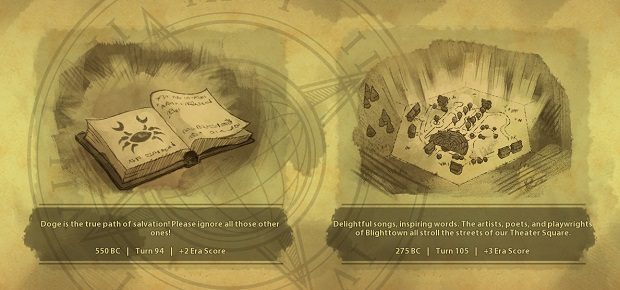Civilization 6: Rise and Fall review
The Wrath of Khan.
Messy, boisterous, chaotic - Civilization 6: Rise and Fall is the antidote to the Enlightenment.
I have this feeling that no one is actually any good at playing Civilization. There probably is someone, sure, but it feels like there isn't. I definitely don't know anyone who's any good, and the people who I know to be not-so-good at Civ only seem to know other people who are also not-so-good at Civ.
The more I think about that the more I realise it's probably the point. To play Civilization is to constantly bounce between knowing exactly what you're doing and having no idea what you're doing. A lot of the time it's both mixed together - I know I need to be building cavalry, because I'm going for a military victory with Genghis Khan and so I know cavalry are good, but when should I be building them? Should I be worrying about growing my Production first so I can churn them out faster? And what about Science - if the war goes on for long enough I can't risk getting left behind in the arms race, so when do I start thinking about that?
With time, that uncertainty inevitably starts to fade. The more you play, the more you learn about build orders and min-maxing and optimisation in its many, many forms. Get your cavalry out early and the Production will come from your Encampment buildings, and Science from citizens of the Civs you conquer.
The type of Age you're in determines the hue of your screen. Golden Ages are BRIGHT.
It means that things begin to fall into place. The world shrinks, to put it in very Civilization terms. The more you play the more the possibilities fade, and you reach your own version of the Enlightenment that reveals the truth, and eliminates the mystery. The almighty deities that we looked to for answers - that we feel like when we're getting right - become this dwindling God of the Gaps, and the joy of discovery can only exist in the fewer and fewer places we haven't already mapped out and written down and posted to Reddit.
That's part of the game - part of it's sort of meta-cycle, in a way, that progresses as you spend time with it. Just as maps are revealed and resources uncovered as you hurtle through the ages, so are strategies devised and first-ten or -twenty turns decided in advance. It's still fun - finally figuring out the ultimate Leader-Trait-Policy-Wonder combo is its own kind of late-game power fantasy. I'm a powerhouse of efficacy, like my Civilization is a powerhouse of my intelligent design.
But you do start to miss the mystery, and so the Enlightenment is the sickness to which Civilization 6's Rise and Fall expansion is, I think, a wonderful cure.
It's a simple fix, in a way - with Rise and Fall there is now just lots of new stuff. But that new stuff is also brilliantly devised. A range of new leaders is a major part of that. I'd normally say it's the least exciting part of an expansion like this because it doesn't really change anything material in the game - new leaders alone normally don't mess with the underlying mechanics, or force you to think about something new - but Rise and Fall's roster is an exception, and in fact it's exceptional.
The array of new Governors you can choose from - each time you earn a new one, you can opt to promote a current one for a new bonus instead.
The new leaders are so good because they're so distinct. Rise and Fall, at times, feels like the shackles have come off, and the team at Firaxis can finally play around a bit, and it shows. In vanilla Civ the most instantly recognisable leader is universally known to be Ghandi. Purveyor of peace but also wildly nuke-happy in the late game, Ghandi is a character. There are a handful of others that stand out in regular Civilization 6, like Russia's Peter, and Spain's Philip II, but Rise and Fall's nine new leaders - at least in my experience so far - are almost all Ghandis. Maybe they're not so comically conflicted in policy but they're absolutely their own in terms of style - there's an idea, a philosophy, or just a singular motivation to each, and it shows - liberation for the Mapuche (and a wonderful real-world tie-in between Lautaro and Philip II's conquistadors that you should absolutely read into), or diplomacy for the Cree.
My longest playthrough so far has been with the aforementioned Genghis Khan, and while his particular way of going about things is a bit obvious, it's the way his traits tie together, like many of the new Leaders, that makes it feel so distinct: trading with any other city immediately puts a Trading Post at the destination; Trading Posts increase your diplomatic visibility with that location's Civ; and increased diplomatic visibility translates into increased military effectiveness. So you trade with someone for a bit of gold, spend it on units, and then you throw a dozen early-game horsemen at them - which have a chance of converting enemy cavalry themselves - and suddenly the Mongolian horde is rolling.
Mongolian horde rolling a bit too well, it seems.
Okay, that's a fairly simple example, and there are some concerns already making their way through the community about certain particularly well-synergised new Leaders - namely the new Science-boosting Seondeok of Korea - and how they might be a little too easy to get going, but they're still identifiable, and memorable, and when you think about these characters and that fact that they all played a monumental part in shaping their nation's identity in the real world, and much of the context of the world in which we now live, ultimately that's got to be the point.
All that lovely synergy can, admittedly, sound a lot like the predictability and efficiency that I've lamented, that this expansion is supposed to fix - but the new Leaders are only really a small part of the expansion. The real headline stuff is the three new systems - which really work together as one big system - in the form of Loyalty, Governors and Great Ages.
Great Ages bring back Golden Ages - yes, Civ 6 really didn't have Golden Ages in it from the off, I know - but now in a far more complex, nuanced mechanic that also introduces Dark Ages and Heroic Ages to the mix. To earn a Golden Age you need to gain a certain number of Era Points before the world moves from one to the next, like the Classical Era to the Medieval Era. If you don't earn enough for a Golden Age you just get a normal age, and if you don't earn enough for that, you'll fall into a Dark Age - successfully propel yourself out of that into the Golden Age bracket though and you'll earn a special Heroic Age. Each has their benefits - even the dreaded Dark Age, thanks to some unique Policies that significantly boost one thing at the cost of another, like launching the Inquisition to boost religion at the cost of scientific progress.
The benefits of a Golden or Heroic Age, and the costs of a Dark Age, combined with the fact that Era Points are earned for all manner of achievements like discovering Wonders or defeating Barbarians - the moment-to-moment stuff that can go a little dry if you've been playing Civ for a while - means that it's constantly at the back of your mind. You can imagine the tension - and in my first game I experienced all four in a row, so I can vouch for it - and it completely shifts how you think about a game. Suddenly you don't just want to beat someone to constructing a Wonder for its own benefits - you need it for that last four points that stop you slipping into a Dark Age.
And that's where it ties in smartly with the other systems, because Dark Ages cause a drop in your cities' Loyalty - they can now rebel against you, or even be converted to another Civ - and Golden Ages boost it. Governors, which are earned like Envoys and placed in specific Cities to give them unique bonuses of their own, also affect Loyalty. Some are built around it, like the Diplomat, whilst the others just add a passive boost to it with their presence.
Smart use of a Governor could see you tip a crucial enemy city into rebellion, so you can swoop in with troops - or just your own Civ's diplomatic influence - to claim it for your own. The Governors themselves can also drastically change how you play the game, with new possible combos to strike with their usage that help Trade Routes and Commercial Hubs, say, or grant new ways to grow the smaller cities you might have spawned later in the game.
The Timeline is a nice aesthetic touch, but in Rise and Fall it's also hugely important.
A few other, more banal but equally important community complaints are addressed in their own ways with the expansion too. The AI - which will always be a bit weird and irrational in a 4X game like Civ because, for one, that's just how humans work - makes a little more sense thanks to a spate of new Agendas - some genius in their predictability and some equally so for the opposite reason, which I shan't spoil - and the knock-on effects of a Loyalty system that means aggressive forward-settling, where the AI would often pop up cities right on your borders before you got a chance to expand, is deterred by the fact they'll probably convert to your own Civ because of its proximity. Then there's the new Emergency Alliance system that will pop up when someone gets a bit too Alexander the Great, giving you a chance to bounce back from defeat or consolidate a lead.
The overwhelming sense from all of this is that here are just all manner of new factors to consider, new mountains of optimisation to mine and explore, and it's exactly what Civilization 6 needs. It can feel like pure chaos at times, like they should have called it Back and Forth, rather than Rise and Fall, and it's all going a bit haywire and making you wonder if you're really a smart enough human being to be playing this game at all, like it must be made for someone else. But then, inevitably, it swings back the other way, and you nick a city, or push back against that Emergency Alliance for a huge reward, or even just scrape your way into a regular Age to keep your head above the water, and you're back to feeling like a that mysterious, all-conquering deity once again. Rise and Fall is at times complicated and messy, a wilderness, that's the perfect compliment to too much Civilization.































![Glory to Codexia! [2012] Codex 2012](/forums/smiles/campaign_tags/campaign_slushfund2012.png)

















